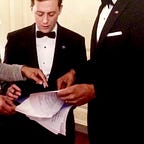The Boiler Room
On Wednesday night, after President Obama and Hillary Clinton had left the stage in Philadelphia, I wandered into the speechwriting boiler room. I say “wandered” in the literal sense — I was trying to leave the arena, and instead I got extremely lost. After several wrong turns and one Bradley Cooper sighting, I stumbled into a windowless office, far too small for the dozen or so people inside it.
Luckily, I was among friends: former White House colleagues, mentors, and some of the very best writers in Washington, DC. They looked equal parts elated and exhausted. Elated because the third night of the convention had drawn the sharpest contrast yet between Hillary Clinton and Donald Trump. Exhausted because they had been working non-stop for the better part of two weeks, and had one more night to go.
I know that feeling. Four years ago in Charlotte, I was part of the team of speechwriters packed into a tiny room in an arena, responsible for well over 100 sets of remarks. Many of these speeches aren’t played live on television. Only a handful make the next day’s news. But Jeff Nussbaum and Ken Baer, the lead writers for every Democratic convention since 2000, treat every set of remarks as if it’s a keynote. Even last night, as as their team was preparing to get a few hours of hard-earned sleep, at least one writer still had her laptop open, polishing and perfecting her draft.
No less important is the quality control these speeches go through. When I wrote for the speechwriting team at the convention, every single set of remarks, whether it was for a Senator in primetime or a small business owner at 6pm, was fact checked. It was edited, often several times. Speech coaches gave pointers about delivery. Policy experts made sure the words on the page reflected the solutions the candidate and the party proposed.
In President Obama’s speech, he talked about how democracy was far bigger than any one person. He talked about the American values, like decency, hard work, and unselfishness, that make America great. Like presidential administrations, conventions draw their character from the character of the person at the top. But to borrow a phrase, they take a village. A successful convention requires people who are willing to work overtime and unwilling to cut corners. It requires people who do their jobs responsibly and with integrity, even when the spotlight is somewhere else. In that sense, conventions aren’t just about a party, but a country. They reflect a vision of who we are.
As I watched Hillary Clinton accept the Democratic nomination, I thought about the history being made onstage. I thought about the remarkable story I’ve been honored to play a tiny part in, and about how the next chapter can be more remarkable still. But I also thought about my friends in the boiler room, unsung heroes of this week in Philadelphia. Day after day, they’ve proven that “stronger together” is more than just words.
